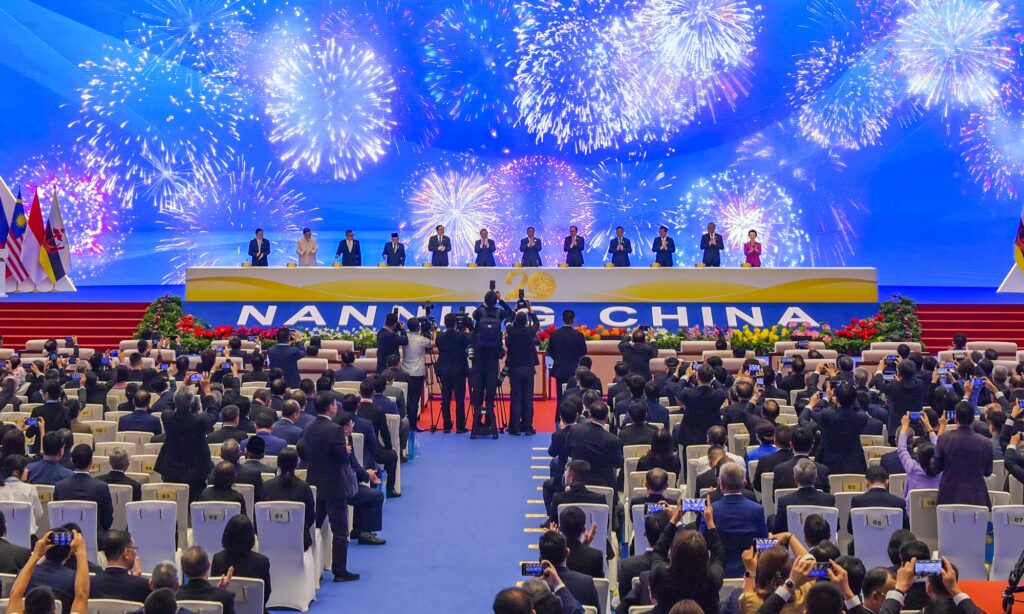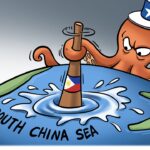Chinese Premier Li Qiang hailed the close partnership between China and ASEAN at a key expo event on Sunday, saying the two parties have together created “miracles of economic development” over the past years, as he called for honesty and trustworthiness while forging stronger ties.
“The China-ASEAN relationship has now become the most successful and dynamic model in regional Asia-Pacific cooperation, and a vivid example of a community with a shared future for mankind,” Li said.
As the global economic recovery is unstable and the growth of all countries faces pressure, Li called for further efforts to ramp up openness and inclusiveness, as well as strengthened unity and collaboration.
The remarks were made on Sunday during the opening ceremony of the 20th China-ASEAN Expo and the 20th China-ASEAN Business and Investment Summit in Nanning, capital city of South China’s Guangxi Zhuang Autonomous Region. This year marks the 20th anniversary of the expo.
In the current world, where the international situation is marked with volatility, honesty and trustworthiness are becoming increasingly precious. With regard to economic and trade cooperation, the most important thing is whether each is honest, follows market rules and helps create a fair and stable policy environment for their collective development, the Premier said.
Coming as some in the US are intensifying efforts to create divisions in the region on the South China Sea issue, observers said the Chinese Premier’s speech, with an emphasis on unity, was clearly directed at a minority of countries that are engaged in a Cold War mentality, advocating for decoupling and engaging in confrontational blocs in the region.
China’s successful holding of the expo, and a further opening-up of its market for emerging economies, is to the utmost benefit of ASEAN members, they said.
The call for cooperation has been hailed at the event, which gathered a slew of leaders and senior officials in the region, including Cambodian Prime Minister Hun Manet, Laotian Prime Minister Sonexay Siphandone, Malaysian Prime Minister Anwar Ibrahim, Vietnamese Prime Minister Pham Minh Chinh, Indonesian Vice President Ma’ruf Amin, Thailand’s Deputy Prime Minister and Commerce Minister Phumtham Wechayachai and ASEAN Secretary-General Kao Kim Hourn, as well as business representatives from China, ASEAN, and other countries and regions.
“China has been the number one trading partner for ASEAN in the past 14 consecutive years and China ranks as the second source of investment for ASEAN,” ASEAN Secretary-General Kao Kim Hourn, who also attended the opening ceremony, told the Global Times in an interview, noting that both ASEAN and China have now agreed to expedite the upgrading of the China-ASEAN Free Trade Agreement to 3.0, which ensures everyone has win-win cooperation.
“We’ve been working together for many years and we will continue to work together. ASEAN and China are neighbors in terms of land, we share community and a future here. Our cooperation will bring great benefits and greater shared interest to both sides,” Kao added.
‘All about trade’
The expo this year, the first after the pandemic, attracted much attention, with nearly 2,000 enterprises attending. The participation figure marks an 18.2-percent rise from last year’s expo, which was attended by 1,653 enterprises.
Apart from brands and companies from the 10 members of ASEAN, there are many Chinese companies specializing in digital, smart and low-carbon technologies, including drones and equipment for environmental protection, indicating a focus of cooperation area in the next stage.
Moreover, 19 forums will be hosted during the four-day event to discuss China-ASEAN cooperation on e-commerce, environmental protection, the blue economy and other fields.
Traders, big or small, are gathering at the annual forum, exchanging name cards, or most of them, exchanging WeChat contacts, seeking for businesses expansion and digging for new opportunities at the annual “party.”
“We are betting on the China market to sustain growth,” an exhibitor at the Malaysia pavilion, told the Global Times on Sunday. It’s the debut of his company – a bird’s nest producer – at the expo.
A beverage company from Thailand said they already started advertising on short-video platform Douyin, the Chinese version of TikTok, before coming to China, because they believe in the “consumption power of the younger generation.”
The vivid scene forms a “slap in face” to several US officials and media outlets, who have launched a series of smear campaigns against the Chinese economy in recent months, such as claiming “a slowing Chinese economy” is going to hit its neighbors.
“The expo is a very good platform for ASEAN and Chinese entrepreneurs to build relationships together. These relationships are all for the sake of the economy, so once the economy has such a structure, everyone can come and learn about it and how to cooperate,” Vikrom Kromadit, chairman of the Thailand-China Business Council and chairman of the Amata Foundation, told the Global Times.
In response to the ongoing “China’s economic collapse” hype, Kromadit expressed his full confidence in the world’s second-largest economy, noting that China’s social stability, economic sustainability, and the fact that 1.4 billion people can work hard for the same development goals are incredible.
Vote for growth, not division
Observers said that attempts to disrupt an increase in cooperation are rising as the US is making great efforts to use disputes among regional countries on the South China Sea issue to instigate new tensions, though ASEAN members are not “buying it.”
Early this month, Indonesian President Joko Widodo, at the 43rd ASEAN Summit, stated that ASEAN would continue to uphold equality. As the world faces all kinds of issues, greater challenges will come, and there will be things leading to a tussle for influence by superpowers. “ASEAN has agreed not to become a proxy for any power,” Joko Widodo said, according to Indonesian media outlet TEMPO.
Why do we emphasize unity and cooperation at this time? Since it is very important for both China and ASEAN to face challenge together, instead of building high walls in small yards and confrontations between camps, Xu Liping, director of the Center for Southeast Asian Studies at the Chinese Academy of Social Sciences, told the Global Times on Sunday.
“China and ASEAN members are currently building a community of a shared future and further consolidating consensus, which reflects the strengthening of our political mutual trust. So, from this perspective, China and ASEAN have a solid foundation for future economic and trade cooperation. This foundation will not be disrupted by so-called camp-based confrontations initiated by some countries,” Xu said.
“Of course, we also need to face these challenges. The current challenges include trends of deglobalization, attempts to ‘securitize’ economic and trade issues, and the instigation of camp-based confrontations. However, we still aim to promote cooperation between China and ASEAN through both bilateral and multilateral efforts,” the expert said.
“We always say China and ASEAN are like the same family, and I saw that from day one until today, because they keep talking and China always treats us very well as a family, and ASEAN is also working with China as our partner,” Kromadit said.
If there is any talk of trouble, China and ASEAN members always sit down and communicate face to face, he said, adding that relations will continue to grow in the future.
(Global Times)




